Hall of Home Learning Fame
Thank you to Alex who has sent me what he has been working on today. Here are his thoughts on the article he read called ‘Car Compositions.’
‘I think I would like it if people made cars with different sounds even though I don’t actually know what sounds they mean. The BMW i4 will be launched next year with different sounds to make the lives of pedestrians ‘’less chaotic and more beautiful’’. It would be cool if cars could make more sounds than just an engine. I really like cars, especially supercars and hypercars. The person who is making the sounds is the composer of the music from the Lion King ( I wouldn’t really like lion king music in my car. )’
Alex also set me a photo of his art work.
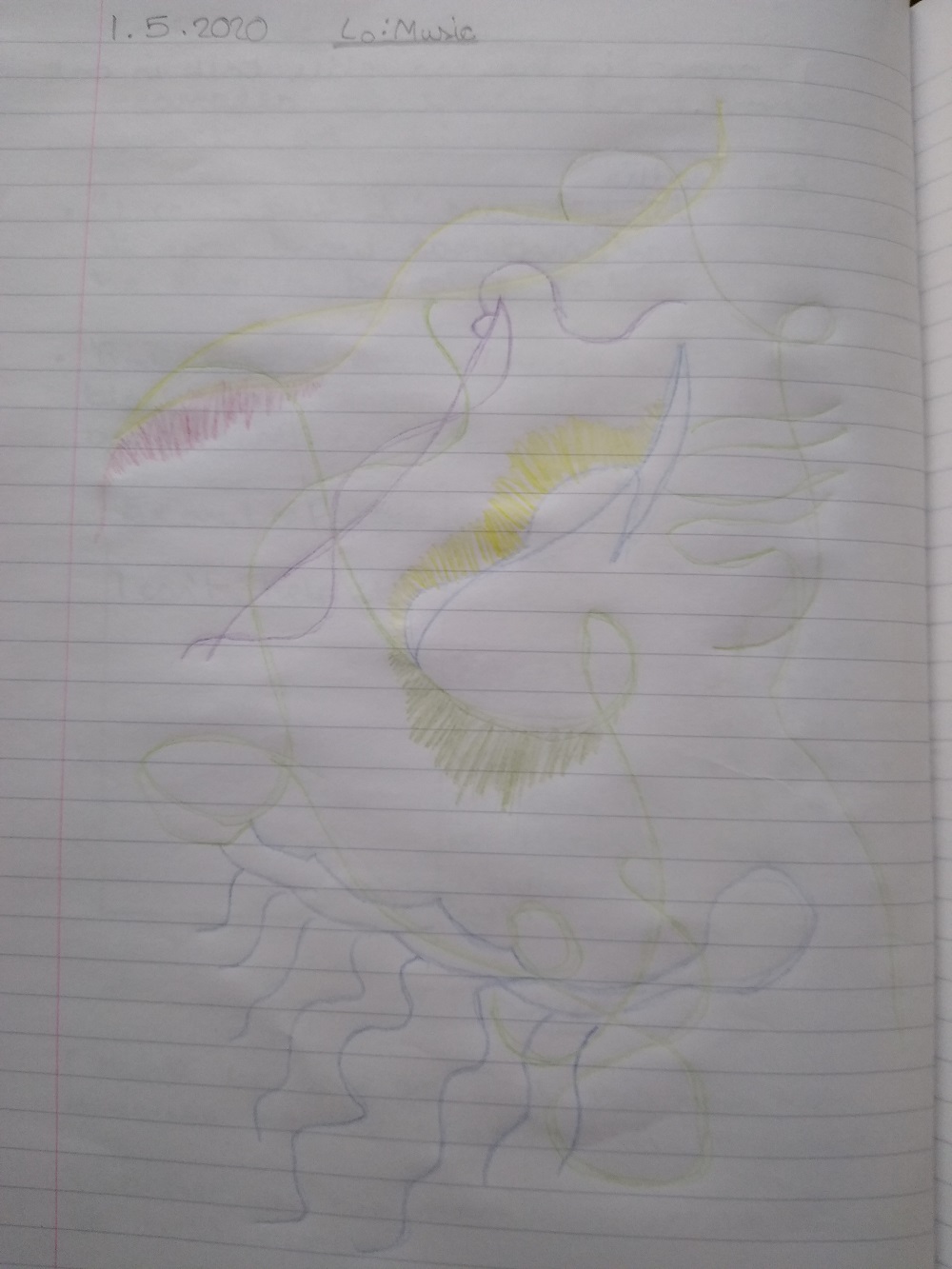
Charlie sent me this message also:
‘The article I am going to talk about is called: Minecraft upgraded. The update introduces ray-tracing to the game. For ray-tracing you need a seriously powerful computer. Ray-tracing has been used in CGI movies for years. I chose this article because I play Minecraft.’
Jessica has been enjoying her learning at home. She has created her time capsule and created her own line graph showing the changes to her heart rate after exercise. She has even found time to make sure she is looking glamorous!


Week 6 Home Learning Pictures
Wow, we have received lots of lovely emails this week showing us all the amazing and exciting learning you have been doing from home. You have all been working so hard and should be really pleased with yourselves. Please keep sending emails with updates about how you are getting on and please email (scholesf2@spherefederation.org) any questions you may have about your child’s learning.
We have particularly enjoyed seeing your predictions for the floating and sinking experiment set by Professor Myers as well as your wonderful story maps for The Smartest Giant in Town.








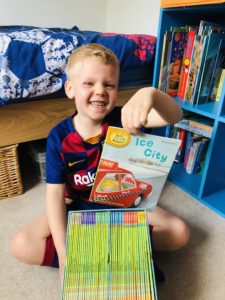
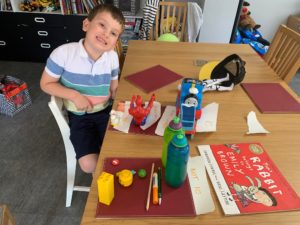
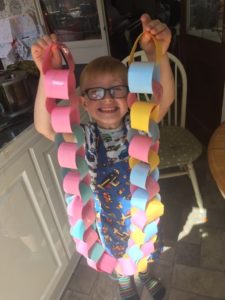

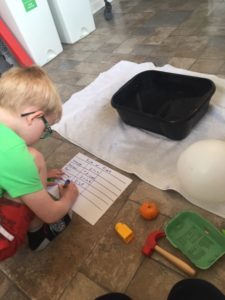
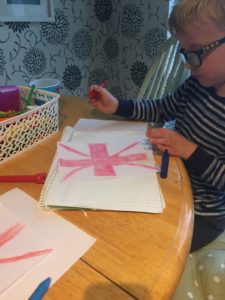

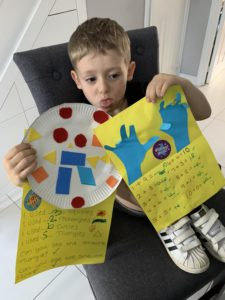

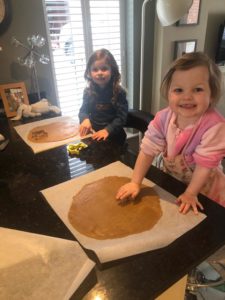






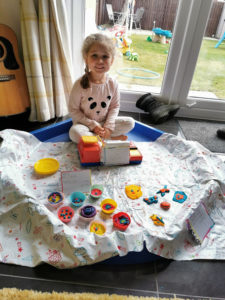





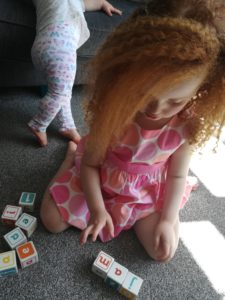

Hall of Home Learning Fame
Eve has independently baked this amazing carrot cake, painted some rocks and even had a go at tie dying a t shirt.
01 May 2020 : Friday extra maths challenges
BBC Bitesize and White Rose Maths have teamed up to create some challenges that will be published every Friday.
Here are today’s :
Year 1 : https://www.bbc.co.uk/bitesize/articles/zhmbrj6
Year 2 : https://www.bbc.co.uk/bitesize/articles/zh23gwx
Story Time
Can you believe it’s Friday again? We know from your emails that many of you are still finding lots of fun activities to keep you busy at home. If you haven’t been in touch with us recently, please send us a quick e-mail to say hello. As usual, we’ve added some of your friend’s photographs at the end of this post so that you can see some familiar faces and find out what everyone else has enjoyed doing.
First of all, here is today’s story for you to enjoy. This week’s story is read by Miss Morris and it’s another favourite of ours. It’s about someone who has terrible teeth, orange eyes, knobbly knees and purple prickles all over his back. Can you guess which story it is? We thought so!
There are two parts to this story, so don’t forget to click on both videos.
We know that this is a favourite story for many children; we love to use the creatures and our Gruffalo toy to retell the story at Nursery. Here are a few things to talk about after you’ve listened to the story.
- What’s your favourite part of the story? Why?
- Who is your favourite character?
- Describe the Gruffalo. What special features does he have?
- Can you remember what the mouse said his favourite food was? How did the Gruffalo feel? How do you know – what did he do at the end?
If you search online, there are lots of Gruffalo themed activities to enjoy. Here are a few that you might like to have a go at.
- We love listening to this Gruffalo song at Nursery. Sing a long at home. Be warned, you might be singing it all day!
- Have a go at moving like the different creatures. Slither like a snake, flap your wings like owl or stomp like the Gruffalo.
- Can you draw the Gruffalo? You could ask an adult to help you with the outline and then draw on his orange eyes, poisonous wart, purple prickles and terrible tusks etc..
- Go for a walk and collect some twigs, leaves, stones etc… When you get home, gather some old pots/pans/bowls that you don’t mind getting dirty. In your garden, using your collected items and a bit of soil or sand and some water, mix them all together to make some ‘Gruffalo crumble’ . We love to play in the mud kitchen at Nursery; it’s great, albeit messy, fun.
- If you have a printer at home, here’s a pairs game to play and a mask that you could print out and make.
- There’s also a Gruffalo games app (free) with some fun memory games to play.
Home Learning
Here’s a selection of your photographs from this week. Lots of you continue to enjoy being outside, learning to ride your bikes and playing football. We’re pleased that a few of you managed to spot some bluebells growing and that you also enjoyed the scavenger hunt. ‘Zog’ was very popular this week; we’ve had photos of castles and some super pictures of Zog breathing fire. It’s also been great to hear that you are helping out with jobs at home, including pegging out the washing and helping to vacuum. Keep it up, Nursery!
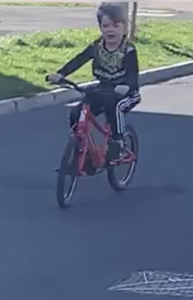
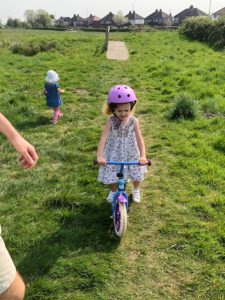
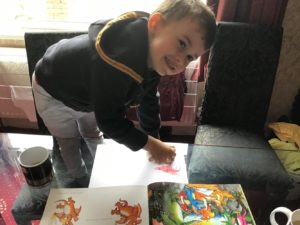
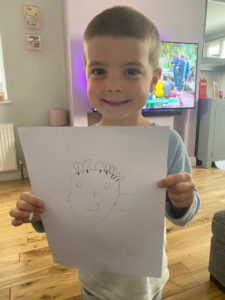
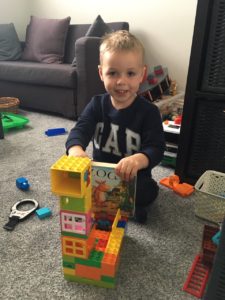
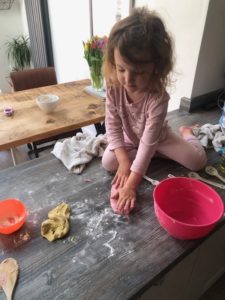
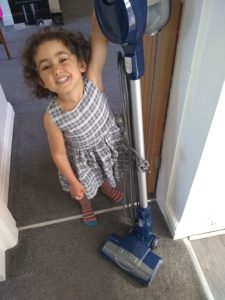
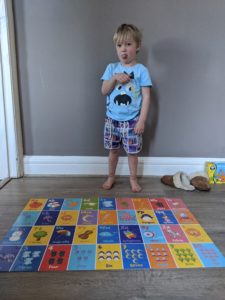
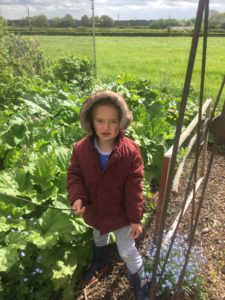
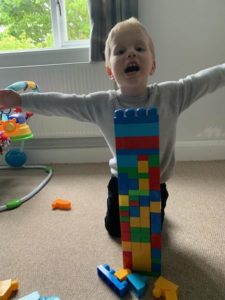
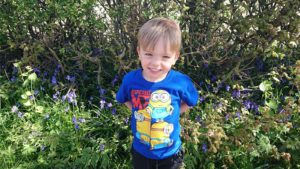
1 May 2020: Home learning
Phonics/Literacy (writing focus)
1.Practise your letter formation in your home learning book. You can use the letter formation ditty’s in your pack to help you.
2.Quickwrite! Write the following digraphs.
Parents: Please read the digraphs to your child. They can then write them their home learning book.
For help with pronunciation –please note ‘z’ is American so incorrect for your child. All other pronunciations are correct.
|
ng |
ai | ee |
oa |
3.Time to talk!
- Dance to the music.
- When the music stops find a partner.
- Talk to your partner about some news you’d like to share.
Remember: to be a good talking partner your eyes should be looking and your ears should be listening AND hearing.
- Now it’s time to write! Practise saying your news in a sentence. Count the words in your sentence. Now write your news in a sentence. Don’t forget to check your writing! You can draw a picture too.
Challenge: Write your news using a narrative e.g. First, then, after that, finally.

Maths

Writing independence
Remember, it is okay for things to be spelt phonetically. It is important your child grows into an independent learner. Encouraging your child to write the words as they sound rather than always spelling correctly is important. It encourages your child to use their own skills – rather than copy from an adult.
It is important you do not let your child simply copy your writing. They need to use their phonics skills to write. Here is an example of a child’s writing in Foundation 2.

Hello Year 5/6 S
Hello.
Well we are nearing the end of another week in lockdown. I thought I’d see how you are all getting on? I hope you are all still working hard on your home learning, but also remembering to spend some time in the fresh air (and rain) as this is very important. There are still some people that I haven’t heard from yet, so please send me an email to let me know what you’ve been up to. Thanks to all those people who keep in regular contact- I love getting your emails.
Keep in touch and let me know what yummy things you’ve eaten recently and how you’re all keeping yourselves entertained.
Mrs H.x
30 April 2020: Hall of (home learning) Fame
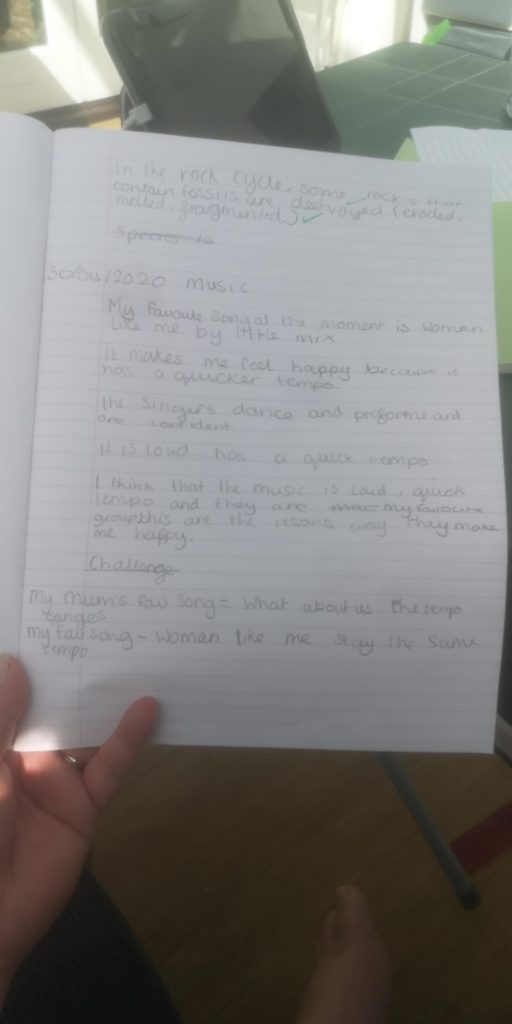
Thank you to Ava for sending me a photo of her learning this morning. She obviously enjoyed the music task. I like the way she has used the word ‘tempo’ and also included her mum’s favourite song. Thanks also to Charlie who emailed me to tell me his favourite song is Bleed America by Jimmy Eat World – have a listen to it if you get chance.
Ava also sent in her maths learning for today – she has been completing the angle task. Well done!



Music: singing with feeling
Eva’s favourite song is Love on Top by Beyoncé. She says that it makes her feel warm and want to sing along. She thinks it’s the beat and the way Beyoncé sings it that makes her feel that way. She’s sings it confidently and loudly.


